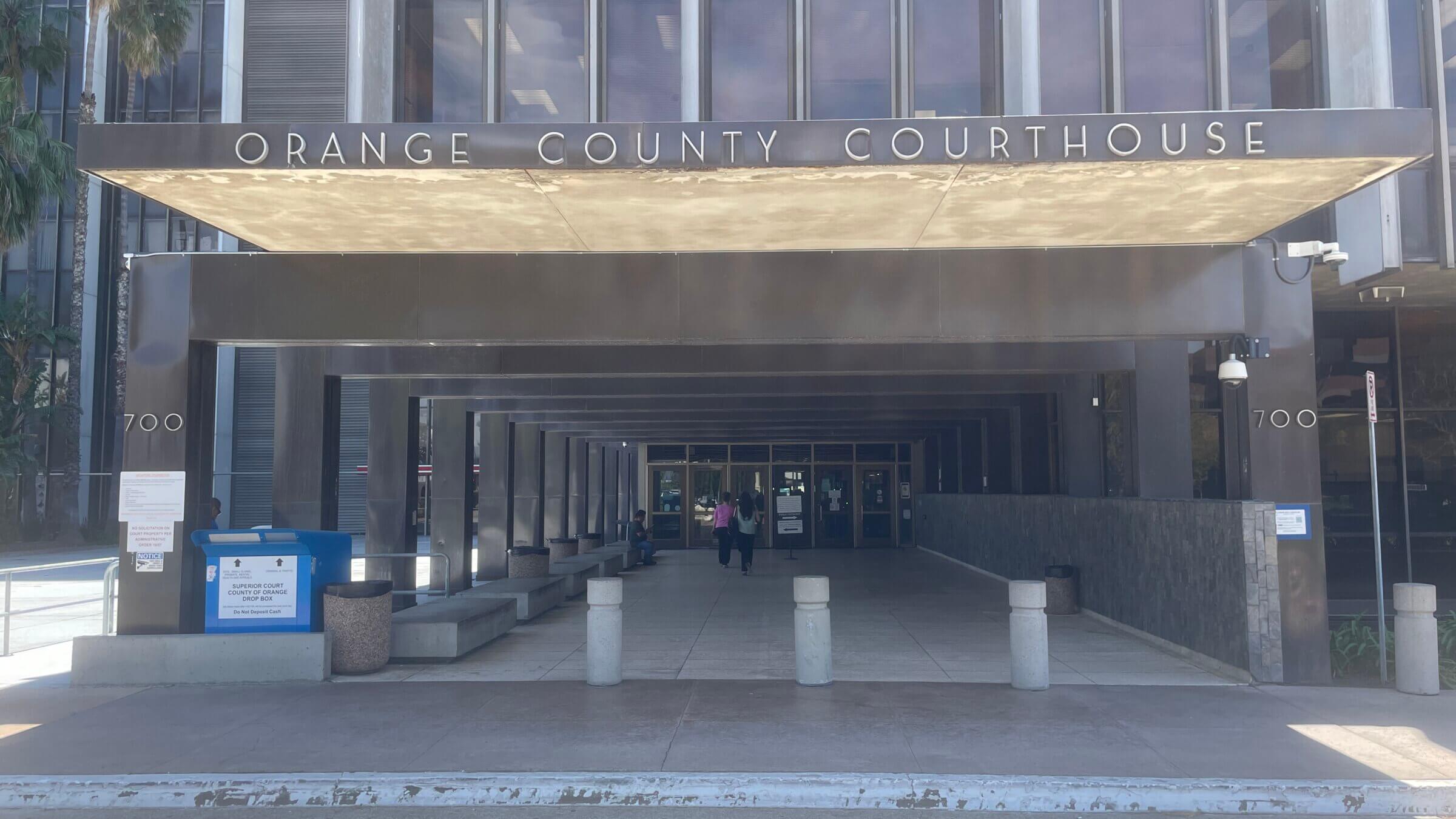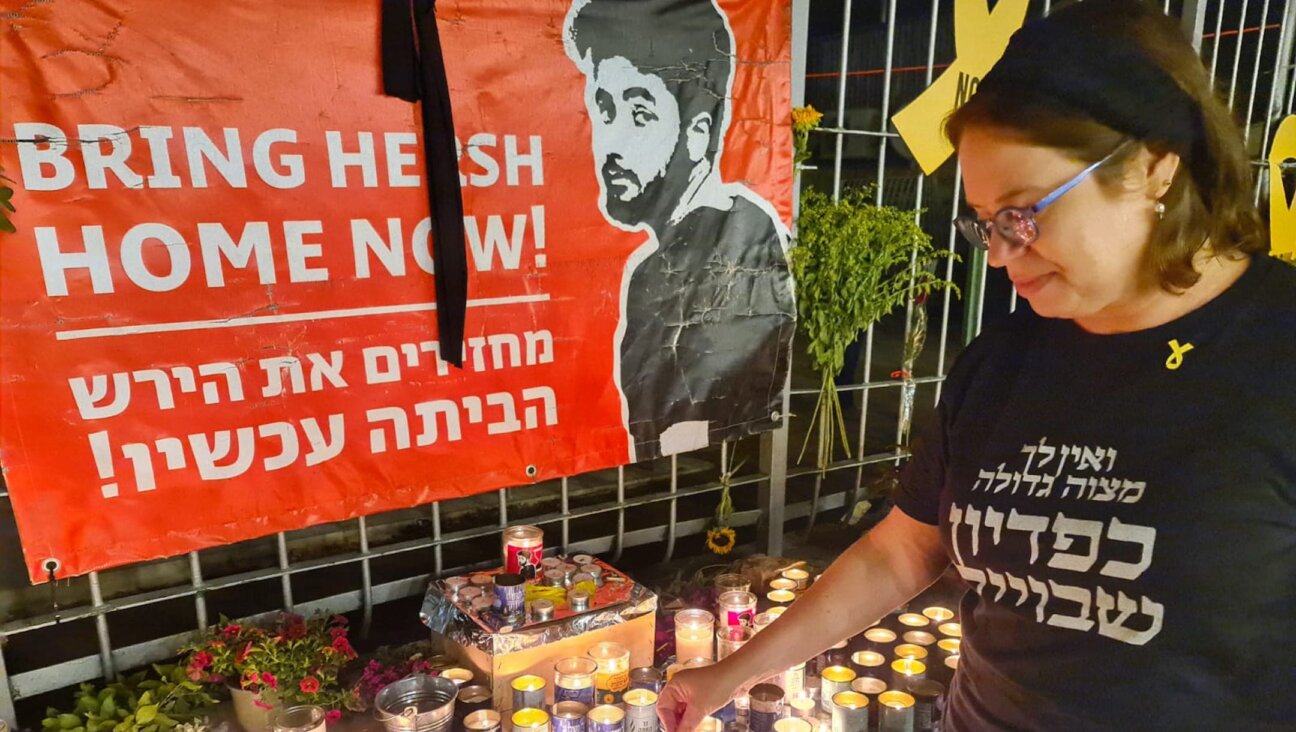In Blaze Bernstein murder trial, mother of accused testifies about his troubled childhood
Michele Woodward, whose son is accused of first-degree murder, proved an evasive witness

The Central Justice Center of Orange County Superior Court in Santa Ana, Calif. Photo by Louis Keene
SANTA ANA, Calif. – With her son facing first-degree murder and hate crime charges for the death of Blaze Bernstein, Michele Woodward provided hundreds of pages of family history to aid his defense.
In his opening statement, Samuel Woodward’s attorney said those documents — along with hours of interviews she had given defense investigators — would help establish that he grew up in a toxic home, leaving him vulnerable to neo-Nazi recruitment as he sought acceptance outside of it.
Yet something strange happened with Michele Woodward under oath: She had trouble remembering many of the things she had once vividly described. Looking at the evidence she herself had provided — among it report cards, medical records, journal entries and handwritten correspondence — hardly helped refresh her memory.
“I don’t recall,” Woodward said, over and over, during four days of testimony in an Orange County courtroom that concluded May 29.
With the defense now calling witnesses — Michele Woodward was its second — the facts of the case have largely been established. Samuel Woodward’s attorney in his opening statement conceded his client, then 20, stabbed 19-year-old Bernstein to death on the night of Jan. 2, 2018, then buried his body in an Orange County park. What’s contested is the defendant’s state of mind leading up to the killing — whether, as prosecutors allege, he plotted to murder his gay and Jewish former high school classmate, or whether he reacted violently to something Bernstein did or said that night.
Michele Woodward’s evasiveness on the stand may have revealed a mother not quite ready to bury the family to save her younger son. But defense and prosecution — drawing on her meticulous record-keeping as a parent trying to keep her younger son on track — eventually extracted from her a troubling picture of Samuel’s lonely childhood with undiagnosed autism, his rough adolescence and eventual descent into violence.
An outcast
Michele Woodward characterized Samuel’s early years as typical — “He was energetic, bright, intelligent, friendly, outgoing,” she said — but signs of neurodivergence appeared as early as preschool. He didn’t like the way T-shirts felt on his neck, and his shoes had to be tied just right.
From the beginning, he struggled to fit in at school. His kindergarten teacher noted he got into frequent verbal disagreements with his peers. In first and second grade, he couldn’t manage playdates with other kids; in third grade, a teacher noted Sam had trouble controlling his anger and frustration. But his social struggles only set in for her when she saw him sitting alone on a bus to science camp in fifth grade.
“That was emblematic of his not really having a lot of friends,” she said.
Around that time, he was also starting to demonstrate fixations on certain things — sharks and spiders, at first, then cars and airplanes, and later, history, with a special interest in World War II. (She later admitted it was a fascination with the Nazis.) He won a history award at school, but was teased by classmates for his interest in nature, she said.
If his physical sensitivity, social skill deficiencies and narrowly focused interests were clues to an autism diagnosis, Michele Woodward didn’t pick up on it.
“I didn’t think Sam was on the spectrum,” she said. It was not until his late adolescence that she sought a diagnosis.
Defense attorney Ken Morrison asked if she was worried about being stigmatized if people learned Sam was autistic. “I don’t recall,” she replied.
“Was it important to you to be seen as normal?”
“Yes,” she said.
“Is that still important to you?”
“Yes.”
From the back-and-forth a picture emerged of an teenager alienated — not just out in the world but also at home.

Sexual repression
Much of the basis for Morrison’s portrayal of the Woodward household as homophobic and repressive is an interview Samuel’s father, Blake Woodward, gave defense investigators in 2019, in which he said he believed homosexuality was a sin and that Samuel’s older brother, Clay, had bullied him.
As the Bernstein parents had testified about celebrating Jewish holidays and their son’s bar mitzvah, Michele Woodward described the importance of Catholicism in her household. The family attended church every Sunday — Michele went daily — and the Harry Potter franchise was banned because, she later wrote in a letter to her son, it conveyed that “witchcraft and dark forces are fun.”
In a line of questioning about the family’s religious views, she said that homosexuality was more an “issue” for her husband than for her. Yet she admitted telling her son on one occasion — she couldn’t recall when — that “if you choose that lifestyle, it’ll be hard.” And she volunteered an additional explanation for her husband’s misgivings: “My husband was molested when he was 16 and he said ‘No — not for Sam.’” The comment was deleted from the record because it did not directly answer Morrison’s question.
Morrison’s questioning grew more direct — and his witness more elusive — when the subject turned to her husband and older son. Michele said she had heard them disparage gay people in front of Sam. But she said she could not recall either her husband or Clay calling Sam gay, or calling him “a faggot.” (Nor could she recall previously telling an investigator that she had heard them do so often, as Morrison claimed.) And she said that while her husband had on occasion been verbally abusive to Sam, she had never seen Blake strike him.
Challenged on this, she admitted they had “wrestled aggressively” when Sam was mad at Blake. But the notion that Blake beat Sam and called him a slur, she said, was “absurd.”
Her careful hedging in answers about Clay, who is two years Sam’s elder, drew a point-blank question from Morrison.
“Are you concerned with how Clay is portrayed in this trial?” Morrison asked.
“Yes,” she replied.
Both Clay and Blake Woodward are expected to testify, as is Samuel.
Turning violent
While Morrison focused on how the Woodwards treated Sam, lead prosecutor Jennifer Walker honed in on the parents’ powerlessness against Sam’s increasingly antisocial behavior as he got older.
Hoping to mitigate Sam’s isolation as he entered high school, Michele Woodward created a guide for him that included tips on how to talk to girls and how to navigate high school without friends. It did not seem to help, and Sam later accused her of being overbearing.
At home, they fought constantly. By the time Sam was a teenager, Michele and her husband were communicating to him through letters, she said, because that was the only way they could cover multiple topics without getting “negative feedback.” He was spending more time locked in his room or in the bathroom.
In a six-page letter she wrote Sam not long before he left for college, she describes Sam’s rage as involving screaming, name calling, swearing, breaking things and physical violence. (He dropped out of college, California State University Channel Islands, and moved back home after one semester.)
“For my own health, I can’t engage with you while you are raging,” she wrote. “When you are raging I am going to leave the room. When I excuse myself, do not get physical with me.”
On the stand, however, Woodward said she had merely listed things she did not want him to do when he was mad, not necessarily things he had done.
Walker read her back the letter, quoting a sentence that ended “after your intense outpouring of yelling words and destroying property.”
“I don’t remember the property part,” Woodward said.
“Would you write that if it were untrue?” Walker asked.
“No,” she said.






















